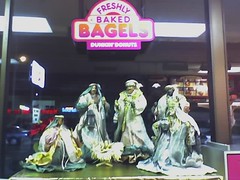The Middle Mind
Like just about any other social critic on the left, White repeatedly asserts that capitalism is a restrictive force and that popular entertainment is mostly stupefying crap. From this basis, White proceeds to argue that our intellectual "poverty" is a threat in more than just a political sense—it limits the scope of life in every imaginable sense. The argument would be more effective if White restrained himself from making unhelpful comments about the examples he presents—whether or not the court settlement of the 2000 presidential election was fraudulent or not, for example, is mostly irrelevant to White's argument, beyond what insight it provides about the open luridness White sees in politics today. White's incessant pithy references to it only encourage what he calls "the dictatorship of the present."
Despite a few such flaws, the book reminds us that if we're to quick to believe that our freedom is guaranteed, that freedom becomes benign and useless.


0 Comments:
Post a Comment
<< Home